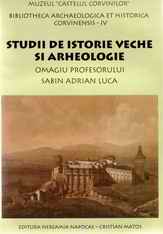Monede 1-18 (in work) |
STUDII DE ISTORIE VECHE ŞI ARHEOLOGIE
BIBLIOTHECA ARCHAEOLOGICA
ET HISTORICA CORVINENSIS – IV MUZEUL „CASTELUL CORVINILOR”
ISBN 973-7951-59-X, Editura Nereamia Napocae – Cristian Matos, Hunedoara 2004 Volum îngrijit de: Cristian
C. Roman, Dragoş Diaconescu,
Nicolae Cerişer
Prelucrare
Web: Cosmin Suciu; Powered
by: Institutul pentru Cercetarea Patrimoniului Cultural
Transilvanean în Context European
(IPTCE)
Rezumat
– Noi monede
din colecţia Castelului Corvinilor din Hunedoara. În acest articol
autorii continuă publicarea monedelor din colecţia Muzeului
„Castelul Corvinilor” din Hunedoara. Monedele au fost împărţite în
trei categorii: monede fără loc de descoperire, monede rezultate în
urma cercetărilor arheologice din punctul „Grădina Castelului”
şi monede găsite în lada de breaslă a cizmarilor din
Hunedoara. In
this article, our main purpose is to continue publishing coins with a well
determined finding place that can be found within the framework of Corvin
Castle Museum's collection from Hunedoara.
In
the following article we have included coins that were found during the
archeological excavations at Hunedoara -,,Grădina Castelului”, as well
as the coins found in the shoemakers guild's chest from Hunedoara that now exists in the
patrimony of „Castelul Corvinilor” Museum of Hunedoara. We also included on the list below another two
more coins without known discovery place, but that we consider to have a
special place in the framework of the museum collection: the denar issued by Mattia Corvin and another one
issued by Ferdinand I. Regarding the coins with a well determined finding
place, these have been classified after their discovery place and after the
order of their issue, making it possible to shape the image of the monetary
group's structure found in shoemakers guild's chest
from Hunedoara. In this way we can notice that the oldest coin found in the
chest is a greschl coin belonging to Maria Theresia, minted for Transylvania
in 1764.The most recent piece is a kreuzer coin which dates from the reign of
Franz Joseph the First, issued in 1892. We have to mention that the pieces
are well preserved, although, in some cases, can be noticed signs of
oxidizing because the coins have not been yet in a conservation laboratory. The coins have been classified
after the finding place for a better correlation with the discovery context.
So they have been classified in three categories: coins without known finding place, coins resulted from archeological
research and coins resulted from the shoemakers guild's chest from Hunedoara. Coins without known finding place
Coins from archaeological site of Hunedoara-„Grădina Castelului”
Coins from Hunedoara shoemakers guild`s chest
|
